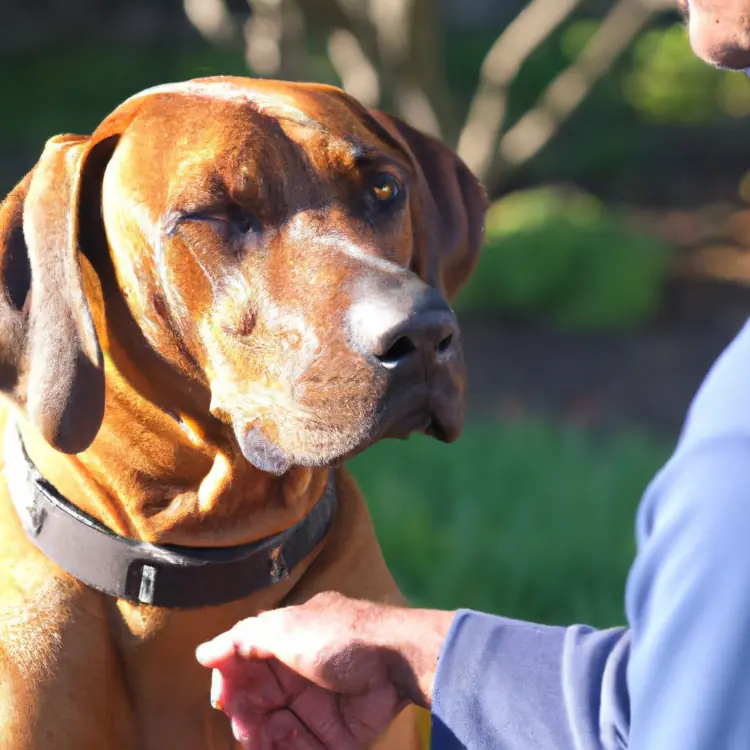Service dogs play a crucial role in assisting individuals with disabilities or specific needs, providing them with the support and help they require to lead more independent lives.
Rhodesian Ridgebacks are a distinct breed known for their unique physical characteristics and temperament.
In this article, we will explore whether a Rhodesian Ridgeback service dog will be the right choice and delve into the factors to consider before choosing them for this role.
Table of contents
Key takeaways
- Rhodesian Ridgebacks make excellent service dogs: They possess the physical strength and stamina needed for various tasks. Their intelligence and loyalty make them well-suited for assisting individuals with specific needs.
- Proper training is crucial: Training Ridgebacks from a young age and using positive reinforcement techniques is essential to ensure they excel in their service dog roles.
- Rhodesian Ridgebacks provide assistance and companionship: These dogs can not only serve individuals with specific needs but also fit well in a family setting, bringing love and support to everyone.
What Is a Service Dog?
A service dog is a specially trained dog that provides assistance to individuals with disabilities.
What Is a Service Dog? These dogs are trained to perform specific tasks to aid their handlers in their daily lives. Service dogs can be trained to help people with a range of disabilities, including physical, sensory, psychiatric, intellectual, and developmental disabilities. They can help with tasks such as guiding individuals who are blind, alerting individuals who are deaf, pulling wheelchairs, retrieving dropped items, and interrupting harmful behaviors in individuals with psychiatric conditions.
It is important to note that service dogs are different from therapy dogs. Service dogs. What Is a Service Dog? are individually trained to perform tasks that mitigate the effects of the person’s disability, while therapy dogs provide comfort and emotional support to others in various settings, such as hospitals or schools.
Service dogs undergo extensive training to ensure they are well-behaved, obedient, and capable of performing their tasks reliably. They must also be able to remain calm and focused in public spaces, as they accompany their handlers wherever they go. The tasks they are trained to perform are customized to meet the specific needs of their handlers.
Fact: The Americans with Disabilities Act (ADA) protects the rights of individuals with disabilities to have service dogs in public places. Service dogs are allowed to accompany their handlers in restaurants, stores, and other public spaces, as long as they are under control and well-behaved.
Rhodesian Ridgeback Background
Rhodesian Ridgebacks are a breed of dog known for their distinctive ridge of fur along their back. They originated in Zimbabwe, formerly known as Rhodesia, hence their name. These dogs are large, muscular, and known for their loyalty and protective nature.
Rhodesian Ridgebacks are intelligent and can be trained to perform various tasks. They are excellent hunting dogs, known for their ability to track and hold down large game, such as lions. Due to their strength and agility, they can also be trained as service dogs.
When considering Rhodesian Ridgebacks as service dogs, it is important to note that their size and energy levels may not be suitable for all individuals. They require regular exercise and mental stimulation to keep them happy and healthy. Proper training and socialization from a young age are crucial to ensure they are well-behaved and obedient.
Rhodesian Ridgebacks have a strong prey drive and may not be suitable for households with small pets. However, with proper training and socialization, they can coexist well with other dogs and be a great addition to a family.
Service Dogs vs. Therapy Dogs: Understanding the Difference

Service dogs and therapy dogs have different roles and purposes. Understanding the difference between the two is crucial.
- Training: Service dogs undergo specialized training to perform specific tasks that assist individuals with disabilities, such as guiding the blind or alerting the deaf. Therapy dogs, on the other hand, are trained to provide comfort and emotional support to people in hospitals, nursing homes, or other therapeutic settings.
- Legal Protection: Service dogs are protected by laws that grant them access to public places. They are allowed to accompany their handlers at all times. In contrast, therapy dogs do not have the same legal rights and access privileges.
- Target Recipients: Service dogs are primarily trained to assist people with disabilities, including physical, sensory, psychiatric, or medical conditions. Therapy dogs interact with various individuals, providing emotional support and comfort to those in need, but they do not have specific individual recipients.
- Training Scope: Service dogs receive extensive training and must meet strict standards to perform their tasks reliably and safely. On the other hand, therapy dogs undergo socialization and basic obedience training to ensure they can remain calm and well-behaved in therapeutic settings.
- Role Focus: Service dogs are task-oriented and focused on assisting their handlers with specific tasks. In contrast, therapy dogs are people-oriented and provide emotional support to individuals, often through interactions such as petting or cuddling.
The difference between service dogs and therapy dogs is essential because their roles and purposes serve distinct needs in society.
Are Rhodesian Ridgebacks Good Service Dogs?
Are Rhodesian Ridgebacks Good Service Dogs? Let’s dig into the different aspects to find out! We’ll compare Rhodesian Ridgeback puppies to adult dogs, explore the significance of proper dog training, and discover the crucial role of the handler. With real facts and practical insights, we’ll uncover whether this breed possesses the qualities needed to excel as service dogs. Get ready to unveil the truth about these beautiful and intelligent dogs!
Rhodesian Ridgeback Puppies vs. Adult Dogs
Rhodesian Ridgeback puppies and adult dogs have distinct characteristics that should be considered when choosing a service dog.
- Rhodesian Ridgeback puppies have a playful and energetic nature, making them great for training and socialization. They are quick learners and can adapt well to new environments. However, they require consistent and patient training to shape their behavior and develop their skills.
- Adult Rhodesian Ridgebacks have a more mature and stable temperament. They are usually well-mannered and have already undergone basic training. They are more focused and better able to handle tasks and responsibilities as service dogs. Their strength and size are also advantageous for certain tasks that may require physical assistance.
When choosing between a Rhodesian Ridgeback puppy and an adult dog as a service dog, it is important to consider the specific needs and requirements of the individual. Factors such as the time and resources available for training, the type of assistance needed, and the physical capabilities of the dog should be taken into account.
It’s worth noting that both puppies and adult dogs can be trained to become successful service dogs. However, the time and effort required for training may vary. Puppies require more intensive and consistent training, while adult dogs may already have some foundational training in place.
The Importance of Proper Dog Training
Proper dog training is crucial when considering the role of Rhodesian Ridgebacks as service dogs. The importance of proper dog training cannot be emphasized enough. Training enables these dogs to effectively assist individuals with specific needs and ensures their safety as well as the safety of others.
Through proper training, Rhodesian Ridgebacks can learn leash training and basic commands, which enable them to navigate various environments and follow instructions from their handlers. Additionally, specialized training is necessary to teach these dogs specific tasks that will benefit individuals with specific needs, including retrieving items, opening doors, and providing support.
It is important to note that training is an ongoing process that requires consistency and dedication. Handlers must develop a strong bond with their Rhodesian Ridgebacks and dedicate time and effort to reinforcing training techniques and commands. Positive reinforcement methods should be incorporated into the training, as they enhance the learning experience for the dog and improve their proficiency in carrying out tasks.
The Role of the Handler
The role of the handler is crucial when it comes to training and working with Rhodesian Ridgebacks as service dogs. The handler’s responsibilities and actions directly impact the dog’s behavior and performance.
- Establishing trust: The handler must develop a strong bond of trust with the Rhodesian Ridgeback. This trust forms the foundation for effective communication and cooperation between the handler and the dog.
- Training guidance: The handler plays a vital role in providing clear and consistent guidance during the training process. They must employ positive reinforcement techniques to encourage desired behaviors and discourage unwanted behaviors.
- Maintaining control: Handlers need to maintain control over the Rhodesian Ridgeback at all times, especially in public settings. They should ensure the dog remains focused on its tasks and follows commands promptly and accurately.
- Monitoring well-being: The handler is responsible for monitoring the health and well-being of the dog. This includes ensuring proper nutrition, regular exercise, and timely veterinary care to maintain the dog’s physical and mental fitness.
- Advocating for the dog: The handler acts as an advocate for the Rhodesian Ridgeback, ensuring their rights and needs are respected in public spaces. They also educate others about the important role of service dogs in society.
The handler’s role is vital in maximizing the potential of Rhodesian Ridgebacks as service dogs. With proper guidance, training, and attention, these dogs can effectively assist individuals with specific needs and improve their overall quality of life.
Benefits of using Rhodesian Ridgebacks as Service Dogs

Rhodesian Ridgebacks make excellent service dogs due to their intelligence, loyalty, and versatility. They can be trained to perform a variety of tasks such as guiding the visually impaired, assisting individuals with mobility challenges, and providing emotional support. Their protective nature and alertness also make them great for personal security and search and rescue missions. Additionally, their low-shedding coat and moderate size make them suitable for indoor living and easy to handle in public spaces.
Assistance for Individuals with Specific Needs
Assistance for individuals with specific needs is an area in which Rhodesian Ridgebacks truly excel. These remarkable dogs have undergone extensive training to provide support and aid for individuals facing various disabilities and challenges. They are capable of assisting individuals with mobility issues by retrieving objects, opening doors, and offering stability while walking. Furthermore, Rhodesian Ridgebacks can be taught to detect and respond to medical emergencies, including seizures and panic attacks. Their heightened intuition allows them to provide a sense of security and comfort for individuals dealing with anxiety or post-traumatic stress disorder (PTSD).
The presence of a Rhodesian Ridgeback can significantly enhance the independence and quality of life for individuals with specific needs. Their strong and resilient nature, combined with their unwavering loyalty and dedication to their handlers, make them highly suitable for this type of assistance.
It is crucial to acknowledge that the training process for these tasks is extensive and necessitates a skilled and experienced handler. The bond of trust and communication between the dog and handler must be cultivated to ensure effective teamwork. With proper training and guidance, Rhodesian Ridgebacks can make a profound impact on the lives of individuals with specific needs, providing them with the essential support and assistance required to navigate daily life.
Challenges and Tips for Training Rhodesian Ridgebacks as Service Dogs

Training Rhodesian Ridgebacks as service dogs presents unique challenges, but with the right approach and techniques, these challenges can be overcome. In this section, we’ll explore two key aspects of training: leash training and basic commands, along with specialized training for specific tasks. Discover effective tips and strategies for successfully training Rhodesian Ridgebacks to become reliable and capable service dogs. From mastering leash manners to honing specialized skills, this section has you covered in your journey to harness the remarkable potential of Rhodesian Ridgebacks as service companions.
Leash Training and Basic Commands
- Leash Training
- Start leash training your Rhodesian Ridgeback puppy as early as possible to establish good habits.
- Use a properly fitted collar or harness and a sturdy leash for effective leash training.
- From the beginning, get your puppy accustomed to wearing the collar or harness and walking indoors with the leash attached.
- Practice walking calmly with your puppy while maintaining a loose leash, and reward them for exhibiting good behavior during leash training.
- Gradually introduce distractions and train your puppy to have proper leash manners in various environments.
- Basic Commands
- Teach your Rhodesian Ridgeback essential commands like sit, stay, down, come, and heel.
- Utilize positive reinforcement techniques, such as treats or praise, to reward your dog for following commands during training sessions.
- Break down commands into small steps and initially practice them in a quiet, distraction-free area, gradually increasing the difficulty as your dog becomes proficient.
- Consistency is key when giving commands and conducting training sessions; use clear and concise verbal cues and hand signals.
- Ensure that your Rhodesian Ridgeback can follow commands in various situations by practicing commands in different locations and gradually adding distractions.
Effective leash training and comprehensive teaching of basic commands are crucial for the development of well-behaved and obedient Rhodesian Ridgebacks. By commencing training at an early stage and employing positive reinforcement techniques, you can enhance their competence in these areas. Remember to maintain consistency and patience during training sessions in order to transform your Rhodesian Ridgeback into a well-trained and reliable companion.
Specialized Training for Specific Tasks
Specialized training for specific tasks is of utmost importance when it comes to Rhodesian Ridgebacks becoming effective service dogs. This training is vital as it empowers them to assist individuals with particular needs and carry out tasks that are customized to meet their unique requirements.
- Task Training: Rhodesian Ridgebacks can undergo training to acquire a diverse range of specialized skills. They can learn how to retrieve medication, offer assistance with mobility by opening doors or fetching items, alert their owners to the doorbell or phone, and provide stability during transfers.
- Scent Detection: With proper training, Rhodesian Ridgebacks can develop the ability to detect specific scents, such as allergens, low blood sugar, or even certain medical conditions. This skill can be life-saving for individuals with allergies or medical conditions that necessitate timely intervention.
- Search and Rescue: Thanks to their tracking instincts and exceptional sense of smell, Rhodesian Ridgebacks excel in search and rescue operations. They can be trained to locate missing individuals, follow scent trails, and offer assistance during emergency situations.
- Emotional Support: Apart from their physical capabilities, Rhodesian Ridgebacks can also provide emotional support to individuals with mental health conditions. They can be trained to provide comfort, alleviate anxiety, and exhibit a calming presence in stressful situations.
- Public Access Training: Rhodesian Ridgebacks require extensive training to ensure their proper behavior in public settings. They must feel comfortable navigating crowded environments, display good manners in social situations, and obey commands from their handlers.
The specialized training that Rhodesian Ridgebacks undergo is crucial in harnessing their inherent abilities and adapting them to meet the specific needs of individuals. This training not only enhances their proficiency but also fosters a strong bond between the dog and their handler, resulting in a successful partnership.
Frequently Asked Questions
While Rhodesian Ridgebacks can make good emotional support dogs and have some qualities that may be beneficial for certain service tasks, they are not commonly used as service dogs. The breed’s sturdy build and ability to walk/run for long periods of time are factors that can be advantageous. However, it’s important to consider other factors such as temperament, health testing, and the specific needs of the disabled person when determining if a Rhodesian Ridgeback is suitable as a service dog.
There are various types of service dogs, including guide dogs for visually impaired individuals, hearing dogs for those who may not hear certain sounds, diabetic alert dogs that can sense changes in blood sugar levels, mobility assistance dogs for individuals with mobility issues, seizure response dogs that can detect and assist during seizures, autism support dogs for children with autism, allergy detection dogs that can detect allergens, and psychiatric service dogs for individuals with mental health issues.
The suitability of Rhodesian Ridgebacks as hearing dogs is not well-documented. While all breeds of dogs have a strong sense of smell and can be trained as allergen detection dogs, the specific training requirements and capabilities of Rhodesian Ridgebacks as hearing dogs have not been extensively explored. Other breeds such as Golden Retrievers and Labrador Retrievers are more commonly used for this purpose.
Service dogs should undergo comprehensive health testing to ensure they are physically fit to perform their tasks. This may include tests for genetic conditions that are common in their breed, hip and elbow evaluations, and overall health check-ups. It’s important to consult with a veterinarian and follow any breed-specific health testing recommendations.
A dog’s temperament can be assessed using various methods, such as the Volhard Test, which evaluates traits like social attraction, sensitivity to touch, dominance, and more. Additionally, interactions with strangers, reactions to loud noises, response to visual stimuli, and behavior around different types of people and dogs can provide insights into a dog’s temperament. It’s crucial to assess a dog’s temperament thoroughly to determine if they have the potential to be a reliable service dog.
Yes, mixed breeds can be trained as service dogs. While certain purebred dog breeds are commonly used as service dogs due to their specific characteristics and trainability, mixed breeds can also possess the necessary qualities and temperament required for service work. It’s important to evaluate each individual dog based on their own traits, rather than solely focusing on breed.





